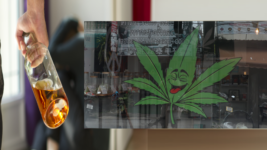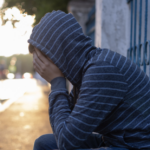Legalising Cannabis Would Lower Domestic Violence Rates

If you’ve ever spent a lot of time drinking in pubs around Sydney, you’ll have heard the legend of the six o’clock swill, which was when bars closed at 6 pm every evening, as a wartime measure, so the patrons, men-only in those days, would scull as much booze as they could before getting kicked out.
In using the term “legend” in relation to the six o’clock swill, it’s more in the sense of being notorious, rather than mythical, because this was how bars operated in NSW between 1916 to 1955. And other states had similar laws for varying periods, with SA not lifting its lockout until 1976.
This six o’clock closing time was especially problematic during the week, as tradies who finished work at 3 pm only had three hours to get loaded, whilst the office workers having to leave at 5 were left with only one hour to wipe themselves out. Remember, it is referred to as the “swill”.
But if you do happen to find mention of the six o’clock swill online, what it doesn’t broach is how the telling, over a few quiets one in the pub, ends, which involves, after all those men downing as many as they could within a limited time frame, then going home to beat up their wives.
This conclusion to the tale is often delivered in a somewhat humorous manner, even though the reality is horrific.
However, the lifting of the six o’clock closing didn’t break the bond between alcohol and domestic violence, rather it just meant beatings were no longer timed events.
Indeed, this association between alcohol and violence, especially of the domestic kind, is well documented and readily known. Although no one is suggesting we ban alcohol.
But there are those who are suggesting that we keep a prohibition on cannabis, which is well known not to have an association with domestic violence, or violence in general for that matter.
Cannabis calms
A 2014 study by the University of Buffalo School of Public Health and the Research Institute on Addictions covered 634 married couples over the first nine years after being wed and found that the use of cannabis lowered rates of domestic violence.
A 2020 study by the University of Pennsylvania covered 24 US states over the 12 years to 2016 to ascertain the effect of cannabis decriminalisation on domestic violence, and it found that there was no reduction in reported DV assaults, but an 18 percent drop in serious DV-related injuries.
And a JAMA Network 2021 study found that in US states where recreational cannabis has been legalised, there has been no increase in assaults amongst any age group, although when it came to self-harm incidents there was a rise amongst men under 40.
One can search the internet and find studies that maintain different outcomes, just like the 1930s US Federal Bureau of Narcotics “Reefer Madness” propaganda concocted back then.
However, if one really wants to see the lower levels of aggression associated with cannabis, hang out with some pot smokers and observe.
The dirtier issue
Cannabis is beginning to be legalised across the planet. The entire nations of Canada, Thailand and Uruguay have done so, along with 19 US states. And the issue is becoming an escalating priority for many Australians, who are fed up with the persistence in its unlawfulness.
There are critics who continue to warn against the herb, but they never raise the issue of violence. However, if the nation was trying to end alcohol prohibition, violence would be the key item on the list of any temperance movement that was campaigning against the move.
But while this is an article advocating for the beneficial impact legal cannabis would have on our society, the real scourge here is the fact that a large number of men continue to think physically abusing women is somehow a valid way to try and make themselves feel powerful.
We’ve all known them. We pass them in the street every day. Men who bash women. Men who are that layer of rust-coloured froth that sits on the surface of stagnant puddles of water.







